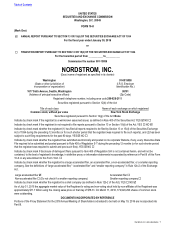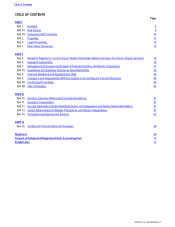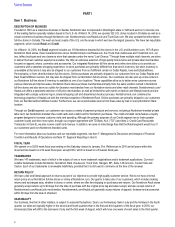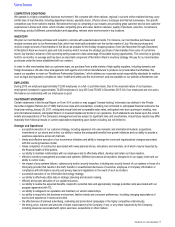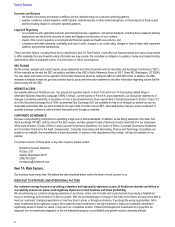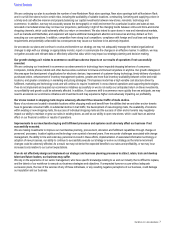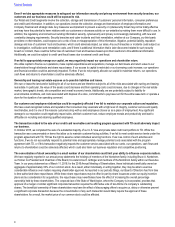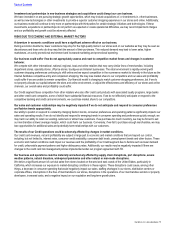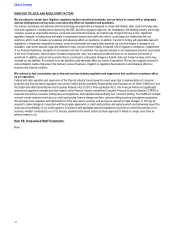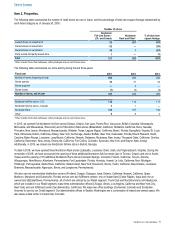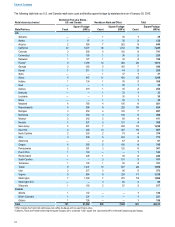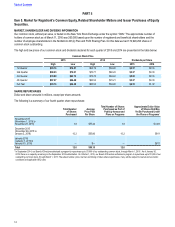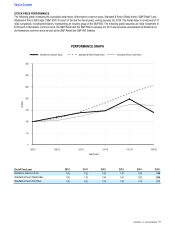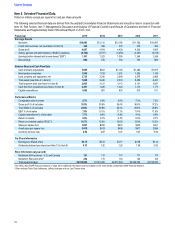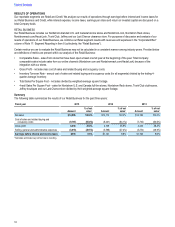Nordstrom 2015 Annual Report Download - page 8
Download and view the complete annual report
Please find page 8 of the 2015 Nordstrom annual report below. You can navigate through the pages in the report by either clicking on the pages listed below, or by using the keyword search tool below to find specific information within the annual report.
Even if we take appropriate measures to safeguard our information security and privacy environment from security breaches, our
customers and our business could still be exposed to risk.
Our Retail and Credit segments involve the collection, storage and transmission of customers€ personal information, consumer preferences
and credit card information. In addition, our operations involve the collection, storage and transmission of employee information and
Company financial and strategic data. Any measures we implement to prevent a security or cybersecurity threat may not be totally effective
and may have the potential to harm relations with our customers or decrease activity on our websites by making them more difficult to use. In
addition, the regulatory environment surrounding information security, cybersecurity and privacy is increasingly demanding, with new and
constantly changing requirements. Security breaches and cyber incidents and their remediation, whether at our Company, our third-party
providers or other retailers, could expose us to a risk of loss or misappropriation of this information, litigation, potential liability, reputation
damage and loss of customers€ trust and business, which could adversely impact our sales. Any such breaches or incidents could subject us
to investigation, notification and remediation costs, and if there is additional information that is later discovered related to such security
breach or incident, there could be further loss of customers€ trust and business based upon their reactions to this additional information.
Additionally, we could be subject to credit card fraud losses due to external credit card fraud.
If we fail to appropriately manage our capital, we may negatively impact our operations and shareholder return.
We utilize capital to finance our operations, make capital expenditures and acquisitions, manage our debt levels and return value to our
shareholders through dividends and share repurchases. If our access to capital is restricted or our borrowing costs increase, our operations
and financial condition could be adversely impacted. Further, if we do not properly allocate our capital to maximize returns, our operations,
cash flows and returns to shareholders could be adversely affected.
Ownership and leasing real estate exposes us to possible liabilities and losses.
We own or lease the land and/or building for all of our stores and are therefore subject to all of the risks associated with owning and leasing
real estate. In particular, the value of the assets could decrease and their operating costs could increase, due to changes in the real estate
market, demographic trends, site competition and overall economic trends. Additionally, we are potentially subject to liability for
environmental conditions, exit costs associated with disposal of a store, commitments to pay base rent for the entire lease term or operate a
store for the duration of an operating covenant.
Our customer and employee relationships could be negatively affected if we fail to maintain our corporate culture and reputation.
We have a well-recognized culture and reputation that consumers may associate with a high level of integrity, customer service and quality
merchandise, and it is one of the reasons customers shop with us and employees choose us as a place of employment. Any significant
damage to our reputation could negatively impact sales, diminish customer trust, reduce employee morale and productivity and lead to
difficulties in recruiting and retaining qualified employees.
The transaction related to the sale of our credit card receivables and resulting program agreement with TD could adversely impact
our business.
In October 2015, we completed the sale of a substantial majority of our U.S. Visa and private label credit card portfolio to TD. While this
transaction was consummated on terms that allow us to maintain customer-facing activities, if we fail to meet certain service levels under the
program agreement with TD, TD has the right to assume certain individual servicing functions. If we lose control of such activities and
functions, if we do•not successfully respond to potential risks and appropriately manage potential costs associated with the program
agreement with TD, or if this transaction negatively impacts the customer service associated with our cards, our operations, cash flows and
returns to shareholders could be adversely affected, which could also harm our business reputation and competitive positioning.
The concentration of stock ownership in a small number of our shareholders could limit your ability to influence corporate matters.
We have regularly reported in our annual proxy statements the holdings of members of the Nordstrom family, including Bruce A. Nordstrom,
our former Co-President and Chairman of the Board, his sister Anne E. Gittinger and members of the Nordstrom family within our Executive
Team. In our proxy statement as of March•11, 2016, for the 2016 Annual Meeting of Shareholders, these individuals beneficially owned an
aggregate of approximately 30% of our common stock. As a result, either individually or acting together, they may be able to exercise
considerable influence over matters requiring shareholder approval. As reported in our periodic filings, our Board of Directors has from time
to time authorized share repurchases. While these share repurchases may be offset in part by share issuances under our equity incentive
plans and as consideration for acquisitions, the repurchases may nevertheless have the effect of increasing the overall percentage
ownership held by these shareholders. The corporate law of the State of Washington, where the Company is incorporated, provides that
approval of a merger or similar significant corporate transaction requires the affirmative vote of two-thirds of a company€s outstanding
shares. The beneficial ownership of these shareholders may have the effect of discouraging offers to acquire us, delay or otherwise prevent
a significant corporate transaction because the consummation of any such transaction would likely require the approval of these
shareholders. As a result, the market price of our common stock could be affected.
Table of Contents
8

